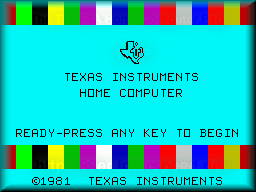 When I was a teenager in the 1980s I purchased my first computer: a TI-99/4A. (Wow, TI's version numbers are more confusing than ours!) I had several friends who had other brands of computers, including the TRS-80 (affectionately known as the "trash 80") and the Commodore 64.
When I was a teenager in the 1980s I purchased my first computer: a TI-99/4A. (Wow, TI's version numbers are more confusing than ours!) I had several friends who had other brands of computers, including the TRS-80 (affectionately known as the "trash 80") and the Commodore 64.
Despite our divisions over computer brands, my friends and I had at least one common experience with our machines: home computing was relegated to the basement. If I wanted to play a computer game or tinker with programming in Extended Basic, I had to go underground, literally.
With that basement-dwelling pedigree, it took a special sort of person to select Computer Science as a field of study. Many of my fellow students were living examples of the stereotypical "comp-sci geek": smart but socially awkward, most of them males, with questionable grooming habits and an unhealthy obsession with role-playing games.
Since then, computers have been promoted to the main living space: we keep them in prime locations such as a home office, family rooms, bedrooms, and even in our pockets (in the form of smart phones). Computer Science has achieved a solid status as a respectable field, even among today's youth. You can admit to your inner geekiness and still get invited to cool parties (grooming habits permitting).
Speaking of parties, it's time to celebrate Computer Science Education Week (Dec 4-10)!. As cool as Comp Sci seems to me, we still must raise awareness of the importance of the discipline, lest we find ourselves with a dwindling pool of smart, technically-oriented critical thinkers.
In celebration, I'd like to re-offer these articles that I wrote to commemorate last year's CSEdWeek:
Computer Science isn't just for geeks anymore
Yes, it's another one of those "back in my day we were all nerds, but now we're cool" posts.
What's my line? (CSEdWeek Edition)
What's the best way to explain a computer science career to a group of 8-year-olds? And why would they be so interested?
Pop quiz for Computer Science Education Week
Fancy yourself a comp-sci aficionado? Try your hand at these questions that any self-respecting CIS pro should be able to answer.

7 Comments
Now, as far as pop-culture mythology goes, it's the bloggers who get relegated to the basement. And guess where my office is ...
lest we find ourselves with a dwindling pool of smart, technically-oriented critical thinkers.
Why should there be fewer technically-oriented critical thinkers now than there were 25 years ago?
Unless those kids are now seduced by the ease and richness of modern gaming instead of doing the hard work of programming BASIC and assembly.
Good question, Ron! If you aren't directly involved in schools, you may not be aware of the alarming decline in the number of students taking computer science courses. It is a complex issue, which I discuss in my blog at http://blogs.sas.com/content/sascom/2011/12/05/theres-nothing-elective-about-computer-science-education/ . I invite you to read and comment, and please share this information with others!
Hello Chris,
Great article - especially for someone who has vivid memories of playing the text adventure 'Haunted House' on my own TI-99/4A (which is still in my garage - along with my BBC Model B with the 32K RAM upgrade and paired double-sided 80 track 5.25" floppy disc drives).
I remember being fascinated with computing ever since reading about the planet-sized valve computers in 'classic era' Science Fiction. I got into coding then because it 1) achieved something useful (albeit a game) and 2) was really, really interesting.
You may be aware that there is now an emerging movement in UK education to reintroduce 'Computer Science' into the curriculum, i.e. how computers work and basic (not BASIC) coding, rather than the current emphasis on just teaching how to use office automation applications.
Maybe one day I will see my grandkids sitting in front of a screen at home code-wrangling and going 'oo ah!' when they create their first spinning 3D polygon with hidden line removal (I lost over a year of my life (and nearly my marriage) playing Elite when it first came out - I even made a proportional joystick from scratch to better control my imaginary spacecraft).
Of course, nothing will ever be a substitute for those happy hours spent entering Hex assembler for the 6502 :)
Pingback: Why “programmer” is not in my job title - The SAS Dummy
Pingback: Why should we teach Roman numerals? - The SAS Dummy
Pingback: What were your #FirstSevenLanguages? - The SAS Dummy